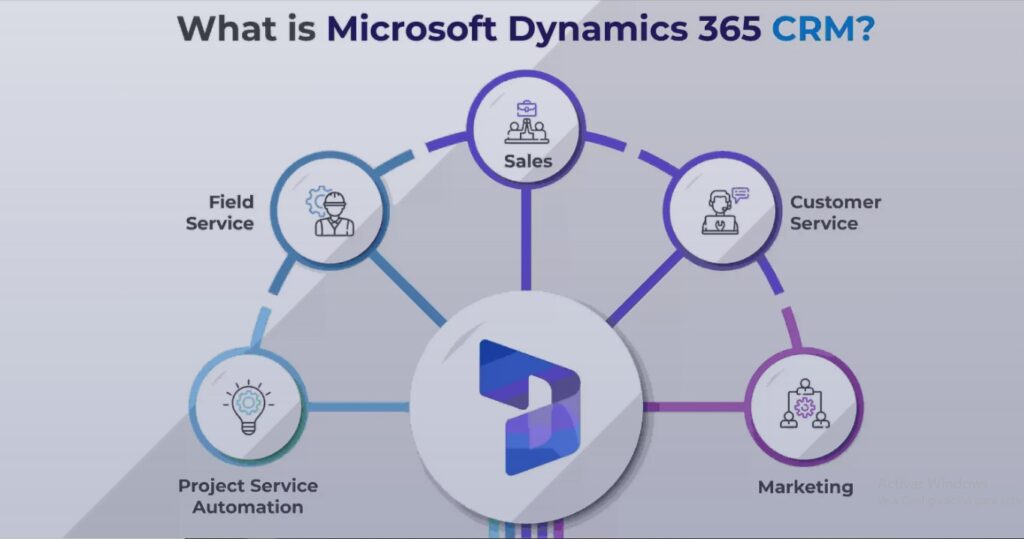In today’s business world, customer relationship management (CRM) has become a critical component to success. With global competition on the rise and customers demanding personalized experiences, companies need advanced tools that allow them to effectively manage their interactions and processes. Microsoft Dynamics 365, a platform that combines CRM and ERP (Enterprise Resource Planning) solutions, is presented as a powerful and versatile solution to meet these needs. This article takes an in-depth look at the Dynamics 365 platform, its key features, and how it can transform business management.
What is Microsoft Dynamics 365?
Microsoft Dynamics 365 is a cloud-based platform that integrates CRM and ERP solutions to provide companies with a unified view of their operations. Launched in 2016, Dynamics 365 was designed to be modular and scalable, allowing companies to choose the modules that best fit their specific needs, and scale the solution as their requirements grow. This platform is deeply integrated with other Microsoft products, such as Office 365, Power BI, and Azure, facilitating a seamless and unified experience.

Key Features of Dynamics 365
1. Modular Solutions.
One of the main strengths of Dynamics 365 is its modular nature. Businesses can select from a wide range of specialized applications that cover various functions, such as sales, customer service, marketing, finance, operations, commerce, and more. This flexibility allows organizations to start with the modules they need and then expand the solution as their needs evolve.
2. Integration with the Microsoft Ecosystem.
Dynamics 365 integrates natively with other Microsoft products, allowing businesses to get the most out of their investment in Microsoft technology. Integration with Office 365 enables seamless collaboration between teams, while Power BI provides advanced analytics capabilities to generate custom reports and dashboards. Additionally, integration with Azure ensures a secure and scalable infrastructure, as well as access to artificial intelligence and machine learning services that can significantly improve operational efficiency.
3. Automation and Workflows
Dynamics 365 offers powerful automation tools that allow companies to optimize their processes and improve efficiency. Automated workflows can be designed to handle repetitive tasks, such as lead tracking, invoicing, and customer service case management. This automation not only saves time, but also reduces the risk of human error, ensuring that operations are performed consistently and accurately.
4. Personalized Customer Experience
At the core of Dynamics 365 is a commitment to providing a highly personalized customer experience. The platform allows companies to get a complete view of each customer, including their interaction history, preferences and purchasing behavior. With this information, companies can personalize their offerings, communicate more effectively, and build stronger, longer-lasting relationships with their customers.
5. Artificial Intelligence and Predictive Analytics
Dynamics 365 incorporates artificial intelligence (AI) and predictive analytics to help businesses make more informed decisions. With capabilities like predictive sales analytics, customer service automation with chatbots, and inventory optimization, businesses can anticipate customer needs, improve operational efficiency, and make strategic decisions based on real-time data.
How Dynamics 365 Transforms Business Management

1. Improvement in Sales Management
The sales function in Dynamics 365 is designed to help sales teams better manage their customer relationships and maximize sales opportunities. The platform offers advanced tools for lead and opportunity management, activity tracking, sales forecasting, and more. Sales reps can access a 360-degree view of their customers, allowing them to personalize their approach and close deals faster. Additionally, with AI integration, sales teams can receive automated recommendations on the best actions to take at each stage of the sales cycle.
2. Customer Service Optimization
Customer service is a critical area where Dynamics 365 delivers significant value. The platform provides tools to manage customer queries and cases efficiently, ensuring that issues are resolved in a timely and satisfactory manner. Additionally, Dynamics 365 enables businesses to offer self-service options to customers, reducing the burden on support teams and improving customer satisfaction. Integrating AI-based chatbots and virtual assistants also allows businesses to automate many support interactions, speeding up response time and freeing up resources for more complex tasks.
3. Marketing Automation
Dynamics 365 for Marketing is a complete solution for managing and automating marketing campaigns. The platform allows marketing teams to create and run multi-channel campaigns, segment audiences, and measure performance in real time. With tools like AI-based lead scoring and email marketing automation, businesses can optimize their marketing efforts to reach the right customers at the right time. This not only improves marketing efficiency but also increases conversion rates and ROI.
4. Efficiency in Financial and Operational Management
Dynamics 365 also includes powerful ERP tools that help businesses manage their finances and operations more effectively. With modules for financial management, supply chain, project management, and manufacturing, Dynamics 365 enables companies to automate critical processes, improve financial accuracy, and optimize the supply chain. Integration with Power BI facilitates real-time financial and operational analysis, enabling business leaders to make more informed and strategic decisions.
Strategies to Implement Dynamics 365 Successfully

1. Needs Assessment and Personalization
Before implementing Dynamics 365, it is essential that companies conduct a thorough assessment of their needs and objectives. Because Dynamics 365 is highly modular and customizable, companies should select the modules that best fit their current processes and plan for the customization necessary to maximize the value of the platform. This assessment should also consider future growth, ensuring that the chosen solution can scale with the business.
2. Training and Training of Personnel
Training is critical to the success of any CRM implementation. Dynamics 365 is a feature-rich platform, and for employees to harness its full potential, they must receive appropriate training. Microsoft offers a variety of training resources, including online tutorials, live courses, and certifications, that can help users become familiar with the platform and use it more effectively.
3. Integration with Existing Tools
Integration with other business tools is key to maximizing the value of Dynamics 365. Companies should explore how Dynamics 365 can integrate with their existing systems, such as accounting software, collaboration tools, and analytics platforms. These integrations not only improve efficiency, but also allow companies to gain a more complete and unified view of their operations.
4. Continuous Monitoring and Optimization
Implementing Dynamics 365 is just the beginning. Companies should continually monitor platform usage and make adjustments as necessary. This includes reviewing automated workflows, updating customizations to align with changing business needs, and taking advantage of new features as Microsoft updates the platform. Continuous optimization ensures that the company continues to benefit from the platform in the long term.
Microsoft Dynamics 365 is a powerful CRM and ERP platform that can transform the way companies manage their customer relationships and internal operations. With its modular approach, deep integration with the Microsoft ecosystem, and advanced automation and artificial intelligence capabilities, Dynamics 365 gives businesses the tools they need to improve efficiency, personalize customer experiences, and make data-driven strategic decisions. By implementing Dynamics 365 with a well-planned strategy and a focus on training and integration, companies can maximize the benefits of this platform and position themselves for success in today’s competitive market.